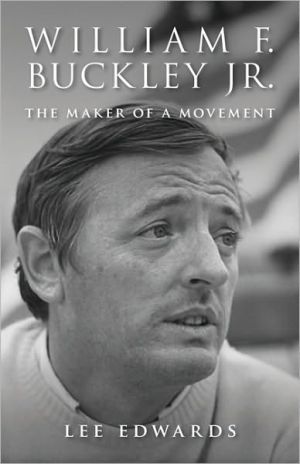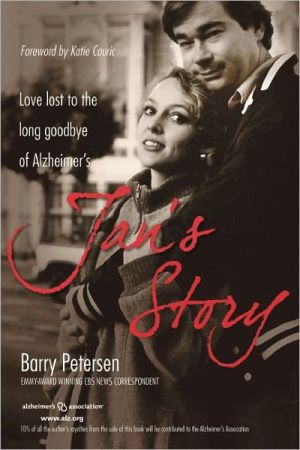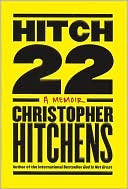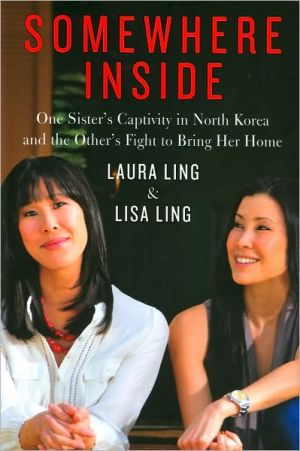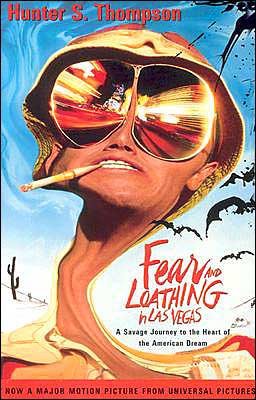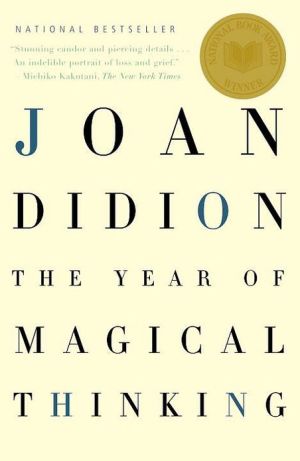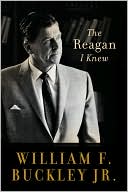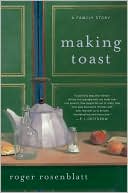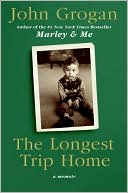William F. Buckley Jr.: The Maker of a Movement
“If you want to understand not only the rise of the modern conservative movement but also how conservatives can regain their footing during these perilous times, you must read William F. Buckley Jr.: The Maker of a Movement. Lee Edwards, himself a conservative icon, describes in beautiful and concise prose the brilliance that was Buckley. The book, like Buckley, is fascinating, compelling, and edifying.”\ —Mark R. Levin, bestselling author of Liberty and Tyranny, nationally...
Search in google:
The modern-day Renaissance man who forged the conservative movement The polysyllabic vocabulary, the wit, the charm, the sailing adventures, the spy novels—all of these have become part of the William F. Buckley Jr. legend. But to consider only Buckley’s charisma and ceaseless energy is to miss that above all he was committed to advancing ideas.In this concise and compelling new biography, noted conservative historian Lee Edwards, who knew Bill Buckley for more than forty years, reveals how Buckley did more than any other individual to build the conservative movement. Once derided as a set of “irritable mental gestures,” conservatism became, under Buckley’s guidance, a political force that transformed America.William F. Buckley Jr.: The Maker of a Movement introduces the four most important intellectual influences on this great molder of American conservatism: libertarian author and social critic Albert Jay Nock, conservative political scientist Willmoore Kendall, ex-Soviet spy Whittaker Chambers, and realpolitik apostle James Burnham. Having dup deep into the voluminous Buckley papers, Edwards also illuminates the profound influence of Buckley’s close-knit family and his unwavering Catholic faith.Edwards brilliantly captures the free spirit and unbounded energy of the conservative polymath, but he also shows that Buckley did not succeed merely on the strength of a winning personality. Rather, Buckley’s achievements were the result of a long series of quite deliberate political acts—many of them overlooked today.William F. Buckley Jr.: The Maker of a Movement tells the remarkable story of a man who could have been a playboy, sailing his yacht and skiing in Switzerland, but who chose to be the Saint Paul of the conservative movement, carrying the message far and wide.
WILLIAM F. BUCKLEY JR.\ The Maker of a Movement \ \ By Lee Edwards \ ISI BOOKS\ Copyright © 2010 Lee Edwards\ All right reserved.\ ISBN: 978-1-935191-73-5 \ \ \ Chapter One\ Growing Up Conservative \ William Frank Buckley Jr. was born in New York City on November 24, 1925, the sixth of the ten children of William F. Buckley Sr., a strong-willed Texan and Irish Catholic, and Aloise Steiner Buckley, the devoutly Catholic daughter of a successful New Orleans business executive. After graduating from the University of Texas, the senior Buckley made and lost a fortune in the oil fields of Mexico and then regained it in Venezuela.\ In search of financing for his business ventures, he moved his large family (and two Mexican nurses) to Paris and then to London in the late 1920s and early 1930s. All of which explains, at least in part, Bill Buckley's unique accent. Until he was three, Billy Buckley was monolingual-in Spanish. His first formal schooling was in French. At five, he was enrolled in a Catholic boarding school in England. In 1933, when he was seven, the Buckley family finally settled down in Sharon, Connecticut, where Will Buckley "went full-bore on implementing his pedagogical ideas."\ "There was nothing complicated about Father's theory of child-rearing," wrote Aloise Buckley Heath, the oldest daughter. "He brought up his sons and daughters to be absolutely perfect." The son who came closest to perfection was Billy Buckley, who strove from the earliest age to please his father.\ Disdaining public education for his children, Will Buckley set up his own school at Great Elm-the family home-employing a small army of private tutors. There was professional instruction in apologetics, art, calligraphy, harmony, painting, piano, speech, and typing. There were tutors in French, Latin, Spanish, and English. There were two full-time teachers, tests, grades, class hours, and requirements for graduation. Several neighborhood children also attended the Buckley "school."\ What education did not occur in the classroom, writes Buckley biographer John B. Judis, took place at the dining table. The father made the children defend their intellectual and political positions. Will Buckley's dinner-table examinations "encouraged a certain kind of performing intelligence among his children." They succeeded or failed not simply by saying the right thing but by "saying it well-with wit and with style." From a very early age, Billy Buckley did both. At six, according to his father, he wrote the king of England demanding that Britain pay her World War I debt.\ The summers were near heaven for Billy and his siblings. They rode horses, swam in the pool, played golf or tennis, and sailed. This idyll was interrupted for forty-five minutes of piano practice every day except for the Fourth of July, Thanksgiving, Christmas-and one's birthday. There were five pianos and an organ in the house. "It was never absolutely clear," Bill Buckley later wrote, "whether the sound was worse when all the pianos were being exercised jointly or when only one of them was being played."\ In the mid-1930s, according to biographers Linda Bridges and John R. Coyne Jr., Will Buckley started taking his family to Camden, South Carolina, for part of the winter. He bought a house far out of town-so far that it was named Kamschatka, after the distant Siberian peninsula. "It was in Camden that the young Buckleys became acquainted with the Southern part of their heritage." Most of that came from Aloise Buckley, who considered herself a "Daughter of the Confederacy." Will Buckley was a Texan, not a southerner. His grandfather had emigrated from Ireland to Canada in the 1840s and then moved his family to San Diego, Texas, a small town only a hundred miles north of the Mexican border.\ The dominant personality of the family was "Father"-Will Buckley, who loved America, trusted the free market, and hated Communism with equal passion. He detested Franklin D. Roosevelt's New Deal. He did not try to mold his children into exact copies of himself, but saw to it that they were prepared, intellectually and morally, to make a difference in whatever profession they chose.\ "He worshiped three earthly things," Bill Buckley later wrote, "learning, beauty, and his family." He was "the most admirable man I ever knew." There was a special relationship between the lather and his precocious son. Bill became "the apple of his lather's eye," Jane Buckley Smith remarked. "Father loved us all," Reid Buckley said, "he respected us for our various talents, but Bill combined the intellectual brilliance with the moral control."\ The Buckleys were ardently Roman Catholic. While attending St. John's Beaumont, a Catholic school in England run by Jesuits, young Bill went to mass every day, praying for the health of his mother, who was in the midst of a difficult pregnancy. He achieved a special reverence for "Our Lady" (Mary, the mother of God), who "became in my mind an indispensable character in the heavenly cloister." He prayed the rosary daily for the rest of his life. It was at this time-he was thirteen-that Buckley developed what he called "a deep and permanent involvement in Catholic Christianity," a statement critical to understanding his unfailing charity as an adult-except in the case of Gore Vidal and Lowell Weicker. When he was sixteen, he wrote his mother that probably the "greatest contribution you have given me is your faith. I can now rely on God in almost any matter." Years later, in his one and only book about his faith, he wrote, "I was baptized a Catholic and reared as one by devoted parents whose emotional and intellectual energies never cloyed. My faith has not wavered."\ At the same time, he did not hesitate to speak his mind to anyone. Within two days of his arrival at St. John's, he called at the office of the school president, a distinguished scholar, and told him there were several things about the school he did not like. The president was so shocked by the young American's boldness that he was "too paralyzed to speak," affording Bill the opportunity to explain the deficiencies of the venerable school.\ In the Army and at Yale\ At fourteen, he followed his brothers to the Millbrook School, a small Protestant preparatory school in nearby New York where he boarded during the week. There Bill honed his writing and debating skills-often with the faculty. He once appeared uninvited at a faculty meeting to report that one of his teachers had deprived him of the right to express his political views in class. He proceeded to expound to the stunned faculty "on the virtues of isolationism, the dignity of the Catholic Church, and the political ignorance of the school staff."\ In his last year at Millbrook, he began reading-at his father's urging-the works of Albert Jay Nock, a radical libertarian who was a frequent luncheon guest at Great Elm. Born in 1870 in Scranton, Pennsylvania, author-editor Nock was a fiercely independent intellectual and severe critic of the state and of unbridled materialism. Ordained in the Episcopal Church in 1897, he served as pastor at several churches before leaving the clergy to take up a career in journalism. He was editor of American Magazine and then the Nation before becoming, in 1920, coeditor of the original Freeman, a magazine of politics and economics. When the Freeman stopped publishing for financial reasons, Nock became a freelance writer, writing pieces for a host of prominent publications and authoring several books. He penned biographies of his favorite thinkers, including Thomas Jefferson and Henry George, the leader of the "Single Tax" movement in the nineteenth century. Nock himself opposed progressive taxation.\ Nock's last and best-known book, Memoirs of a Superfluous Man, was published in 1943, the year Buckley completed high school. In the years to come, Buckley would frequently quote from Nock's Memoirs. In the book, Nock invents what he calls "Epstein's Law" as an explanation of human activity: "Man tends always to satisfy his needs with the least possible exertion." As a result, Nock holds out little hope for any effective political reform. Yet he expresses an almost mystical belief in a "Remnant" of elite writers and thinkers who will one day build a new and free society on the ruins of the modern welfare state (initiated by his least favorite president, Franklin Roosevelt). Memoirs resonates with the conviction that, like the ancient Hebrew prophet, modern-day Isaiahs will emerge to proclaim the truth about man, the state, and liberty.\ A number of leading figures of the postwar Right admired Nock, including Russell Kirk, Robert Nisbet, and Frank Chodorov. They were drawn by his cutting wit-he once wrote that dogs were "natural-born New Dealers," content with whatever their masters gave them-and responded to his gospel of individual freedom. Bill Buckley also admired these traits, as well Nock's passionate antistatism, his radical rhetoric, and his willingness to stick by his ideas regardless of whether they were out of step with the times. Buckley later admitted to publisher Henry Regnery that on several occasions he had made "a mental resolution" to do a book on Nock-"he has always fascinated me."\ Albert Jay Nock-the ultimate individualist-was the first of four conservative writers who would have a profound influence on Bill Buckley. Notably, the man who became synonymous with the term conservative subtitled one collection of his articles and essays Reflections of a Libertarian Journalist.\ When Buckley graduated from Millbrook in 1943 at the head of his class, he was only seventeen, and not eligible for the draft. Not wanting to start at Yale and then leave in the middle of the school year, he spent a few months at the University of Mexico improving his Spanish before he was inducted into the army in July 1944.\ Will Buckley had adamantly opposed America's entry into World War II, and his children shared his isolationist, America First views. But with Pearl Harbor, the patriotism of the Buckleys came to the fore, with John serving in the army in North Africa and France, and Jim in the navy in the Pacific.\ Bill Buckley described his military service as "brief and bloodless," but it was also a rite of passage for the outspoken young conservative. He did his basic training at Camp Wheeler, outside Macon, Georgia, and then in January 1945, at the age of nineteen, he entered the OCS (officers' candidate school) at Fort Benning, Georgia. Although the physical regimen was very demanding, the brash young candidate found it more difficult to be properly deferential to his superiors-and to keep his political opinions to himself. "He was very vocal about his feelings about the Democrats in general and Roosevelt in particular," recalled a friend. His outspokenness did not sit well with his commanders, trained as they were to keep politics and the military separate.\ After graduating from OCS-following an extended debate by Buckley's commanding officers, who at last decided to pass him-he spent the next months as an infantry training officer at Fort Gordon, Georgia. While there he was given a singular and ironic responsibility: he was assigned to the army honor guard that stood by when the body of President Franklin D. Roosevelt was carried to the train that would take him back to Washington, D.C. With the completion of his training, Buckley was sent to Fort Sam Houston in San Antonio because of his Spanish proficiency to participate in counterintelligence activities, but he arrived the day the Japanese surrendered.\ Although still not sufficiently deferential to his superiors-at least in their opinion-Bill Buckley did learn how to get along better with the men around him. In a mature letter of self-examination, he wrote to his father:\ I don't know whether you were aware of this while I was in Millbrook, but I was not very popular with boys.... I determined that the principal reasons for this revolved around my extreme dogmatism-particularly in matters concerning politics and the Catholic Church. I could not understand another point of view....\ When I went into the Army, I learned the importance of tolerance, and the importance of a sense of proportion about all matters-even in regard to religion, morality etc.... I learned ... that regardless of the individual's dogmas, the most important thing as far as I was concerned was the personality: would his friendship broaden your horizon or provide you with intellectual entertainment? I found that there were actually very few prerequisites to the good friend: he had to have a good sense of humor, a pleasant personality and a certain number of common interests.\ Bill Buckley had learned, as biographer John Judis writes, to distinguish "the rules of personal friendship from those of political combat." It was a critical lesson he would apply at Yale University and afterward.\ At Yale, Buckley majored in economics, established himself as one of the best debaters in the university's history, and was tapped by Skull and Bones, the prestigious secret society for seniors, making him one of the biggest men on campus. But his overriding ambition was to be chairman of the Yale Daily News. "I have never run across anything I wanted so much in all my lift," he wrote his father, "as the chairmanship of the News." He would exhibit the same single-mindedness six years later when he determined that what America needed more than anything else was a conservative journal of opinion.\ Following his unanimous election, Buckley began his year as chairman (editor-in-chief) of the newspaper on February 1, 1949. Pre-Buckley, the Yale Daily News had resembled most college papers, reporting the results of fraternity elections, the latest administration press releases, and the ups and downs of the football, basketball, and other athletic teams. But now the News sent reporters to New York and Washington to cover national stories while Chairman Bill editorialized about Yale's educational flaws, the dangers of Communism, the virtues of capitalism, and the many mistakes of President Harry Truman. "There is no indication," Buckley wrote, "that the majority of his backers have elevated Mr. Truman to the White House to lead the United States to socialism." Elsewhere he encouraged the Young Republicans, who were holding a two-day convention nearby, to reassert "the principles of freedom of enterprise [and] anti-New Dealism."\ Buckley editorialized often about the Soviet threat. He once asked, "Will Russia have too long to wait before she spurns [he surely meant 'thumbs'] her nose at conference and diplomacy and invades Finland and Yugoslovia and maybe even Western Germany and France?" If the language seems overheated, note that in the preceding year there had been a Communist coup in Czechoslovakia, Moscow had blockaded West Berlin, the Communist Party of France had become that nation's largest political party, and Whittaker Chambers had named Alger Hiss as a Communist spy.\ In another editorial, Buckley wondered why anybody would be shocked that spokesmen for the Communist Party of the United States had declared that in the event of war with Russia, American Communists would side with the Soviet Union. "We must here assert a well-known fact," he wrote. "[T]he Communist Party of the United States is an agent of Soviet Russia." And after defending pre-World War II isolationism as a "sane" policy, he noted that the "world division into two ideological camps" made such isolationism in 1949 "impossible."\ When a reader challenged an editorial's argument that Yale University had the right, as a private institution, to exclude any and all minorities, Buckley did not back down, anticipating conservative arguments of the 1960s about civil rights legislation. We believe, he wrote, that "discrimination of sorts [is] indispensable to the free society.... Human beings are equal only in the eyes of God."\ In view of what was to come, it is significant that Bill Buckley's collegiate editorials reflected the ideas of what would become the three major strains of American conservatism in the 1950s and 1960s-traditionalism, libertarianism, and anti-Communism.\ He wrote pointed commentaries about "the godless materialism" whose advance threatened civilization, about liberal hypocrites who protested the appearance of musicians who had performed in Nazi Germany but overlooked the appearances of pro-Soviet musicians like Dmitri Shostakovich, and about the views of popular Yale sociologist Raymond Kennedy, who was fond of saying that religion was a "matter of ghosts, spirits, and emotions."\ (Continues...)\ \ \ \ \ Excerpted from WILLIAM F. BUCKLEY JR. by Lee Edwards Copyright © 2010 by Lee Edwards. Excerpted by permission.\ All rights reserved. No part of this excerpt may be reproduced or reprinted without permission in writing from the publisher.\ Excerpts are provided by Dial-A-Book Inc. solely for the personal use of visitors to this web site. \ \
Contents Preface....................9Chapter 1 Growing Up Conservative....................17Chapter 2 Getting It Right....................55Chapter 3 Cruising Speed....................93Chapter 4 The Builder....................129Chapter 5 Last Things....................167Coda....................189Notes....................193Acknowledgments....................211Index....................213
